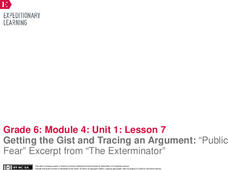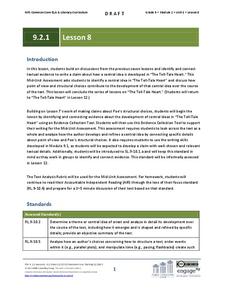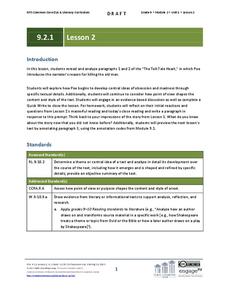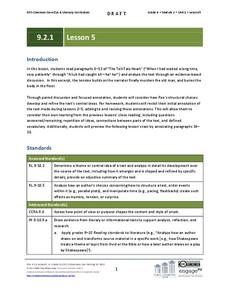EngageNY
Annotating the Text and Identifying Argument, Claims, and Evidence: “Double Whammy” Excerpt from “The Exterminator"
That's a double whammy! Scholars read the excerpt Double Whammy from The Exterminator. After identifying the gist of the text, they annotate by marking the author's claim. The group discusses what is meant by double whammy and complete...
EngageNY
Grade 9 ELA Module 2: Unit 1, Lesson 7
Listen to the low, stifled sound that arises from the souls of your ninth graders when overcharged with awe. Inspire them with a captivating instructional activity about "The Tell-Tale Heart." Learners analyze how Poe uses the story...
EngageNY
Getting the Gist and Tracing an Argument: “Public Fear” Excerpt from “The Exterminator”
Only fear fear itself. Scholars read Public Fear from The Exterminator. Triads work together to annotate and determine the gist of the text. They then complete a Tracing an Argument graphic organizer to identify arguments, claims, and...
EngageNY
Grade 9 ELA Module 2: Unit 1, Lesson 8
Rid yourself of unsupported analytic writing forever with a mid-unit assessment focused on Edgar Allan Poe's "The Tell-Tale Heart." As ninth graders formulate an essay based on evidence from the first seven lessons in the unit, they...
EngageNY
Grade 9 ELA Module 2: Unit 1, Lesson 2
Make up your mind to complete a lesson plan about "The Tell-Tale Heart" and forever rid yourself of simple sentence structures. As ninth graders analyze the first two paragraphs of Edgar Allan Poe's short story, they consider how text...
EngageNY
Grade 9 ELA Module 2, Unit 2, Lesson 8
Prophecy and blindness often go hand in hand, as in Sophocles' Oedipus the King. Explore Oedipus' thoughts about prophecy, fate, and responsibility with an activity focused on the discussion between Creon and Oedipus regarding the murder...
Great Books Foundation
Discussion Guide for Little Women
Start with the question in mind with a discussion activity on Louisa May Alcott's Little Women. With four focus questions, note-taking prompts, and discussion points, readers practice answering thematic questions based on textual evidence.
Curated OER
American Dream and The Great Gatsby
Is the American Dream alive and well or has it dried up and died? As part of a study of The Great Gatsby, class members search for articles on the state of the American Dream, analyze the arguments presented in those articles, and then...
K20 LEARN
Writing An Argumentative Paragraph: Argumentative Writing
Learning how to craft a cogent argument based on a solid claim, supported with evidence and solid reasoning, is an important life skill. Teach middle schoolers about argumentative writing with a lesson asking them to analyze the claims,...
EngageNY
Building Background Knowledge: The Lost Boys of Sudan
Get deep! Teach scholars how to make connections between texts to deepen their understanding of a topic. Using the resource, pupils read and annotate a short informational text about Sudan's Civil War and refugee crisis. Next, they...
EngageNY
The Hero’s Journey, Part 1: What is a Hero?
That was heroic! Scholars quickly look over What is a Hero to determine and discuss the structure of the text. They then read the introduction and Act 1 closely to find the gist and annotate the text. They circle unfamiliar words and...
EngageNY
Reading for Gist and Answering Text-Dependent Questions: Chapter 4 of World without Fish
True or false? Scholars read chapter four of World without Fish and explore the idea of a myth. They discuss in triads the meaning of the myth of nature’s bounty. Learners annotate the text on sticky notes and then answer text-dependent...
EngageNY
Introducing World without Fish
One fish, two fish, red fish, no fish. Scholars analyze World without Fish to determine the gist, identify vocabulary, and answer text-dependent questions. As learners read, they use sticky notes to annotate the text. They also work in...
EngageNY
Reading for Gist, Answering Text-Dependent Questions, and Determining Author’s Purpose: Industrial Organic Food Chain
After re-reading The Omnivore’s Dilemma using a Reading Closely: Guiding Questions handout, class members use sticky notes to annotate and determine the gist of the text. Finally, they use an Author’s Purpose graphic organizer to...
EngageNY
Analyzing Point of View and Figurative Language: Chapter 1
Check out the view! Scholars complete a graphic organizer to analyze how Laurence Yep develops a character's point of view in Dragonwings. Additionally, pupils re-read parts of the novel and annotate the text on sticky notes, looking for...
EngageNY
Inferring Laurence Yep’s Perspective on the Police, from the Crime in the Neighborhood Excerpt of The Lost Garden
Gist get to the point! Pupils read another excerpt from The Lost Garden, author Laurence Yep's autobiography. Working with partners, scholars annotate the text to look for the gist and record unfamiliar vocabulary in their word catchers.
EngageNY
Reading for Gist and Answering Text-Dependent Questions: Chapter 5 of World without Fish
Discover the rules of fishing. Pupils read chapter five of World without Fish to discover ideas about the rules and laws of fishing. They use sticky notes to annotate text as they read about fishing in other countries. They focus on the...
Sullivan County BOCES
Reading Closely Teacher Manual
Wolves are the subject of a series of images, informational texts, videos, websites, and narratives. The activities prompt learners to use close reading skills, including reading closely for textual details, making evidence-based claims,...
EngageNY
Grade 9 ELA Module 2: Unit 1, Lesson 5
Eager readers have waited a long time, very patiently, for a set of literary analysis lessons that connect text structure to the work's central idea. As ninth graders continue reading "The Tell-Tale Heart," they focus on the central...
EngageNY
Grade 9 ELA Module 2, Unit 2, Lesson 14
The devil—and the truth—is in the details. As ninth graders approach the ending of Sophocles' Oedipus the King, they analyze the words of the Messenger and apply these details to the central ideas of fate and prophecy.
National Endowment for the Humanities
A Defense of the Electoral College
Each presidential election year, the debate about the electoral college rages. Michael C. Maibach's "A Defense of the Electoral College" offers young political scientists an opportunity to examine a reasoned argument for why the...
EngageNY
Grade 9 ELA Module 2, Unit 2, Lesson 18
The punishment must fit the crime, even for a king. Sophocles' Oedipus the King meets its grisly end with a lesson that focuses on the conclusion of the play and Oedipus' self-assigned punishment. Learners connect the symbolism of his...
EngageNY
Grade 9 ELA Module 3, Unit 1, Lesson 10
Finish your unit on Temple Grandin's Animals in Translation with a two-part written assessment. As ninth graders refer to their notes, annotations, and discussion guides from the first part of the unit, they prepare for a writing prompt...
National Woman's History Museum
Stacey Abrams: Changing the Trajectory of Protecting People’s Voices and Votes
In this project-based learning lesson, young social scientists investigate Stacey Abrams' campaign to protect the voting rights of people across the nation. Investigators learn how to annotate assigned articles, watch videos, and collect...

























